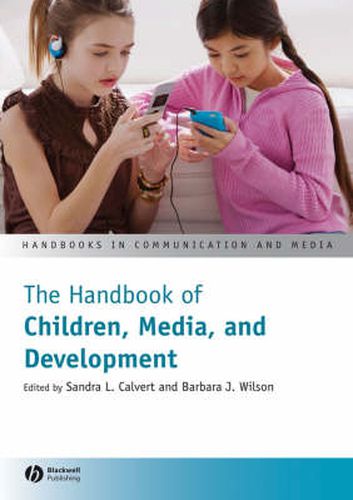Readings Newsletter
Become a Readings Member to make your shopping experience even easier.
Sign in or sign up for free!
You’re not far away from qualifying for FREE standard shipping within Australia
You’ve qualified for FREE standard shipping within Australia
The cart is loading…






Every day children spend a significant amount of their waking time watching and interacting with media. Once a mass experience that was generally one-way and observational, media have increasingly become more interactive. Cell phones, DVDs, plasma monitors, and wireless interfaces add increased control, clarity, and access to media wherever children may be. Media use starts early, in the first year of life. Initial experiences are controlled by parents and caregivers, but increasingly give way to children’s preferences as favorite programs and preferred modes of interaction emerge. The degree to which these experiences are a positive as well as a negative source of developmental change in the cognitive, social, and health areas is an ongoing intellectual debate with significant implications for today’s society. The Handbook of Children, Media, and Development brings together an interdisciplinary group of experts in the fields of developmental psychology, developmental science, communication, and medicine to provide an authoritative, comprehensive, up-to-date look at the empirical research on media and media policies within the field.
$9.00 standard shipping within Australia
FREE standard shipping within Australia for orders over $100.00
Express & International shipping calculated at checkout
Every day children spend a significant amount of their waking time watching and interacting with media. Once a mass experience that was generally one-way and observational, media have increasingly become more interactive. Cell phones, DVDs, plasma monitors, and wireless interfaces add increased control, clarity, and access to media wherever children may be. Media use starts early, in the first year of life. Initial experiences are controlled by parents and caregivers, but increasingly give way to children’s preferences as favorite programs and preferred modes of interaction emerge. The degree to which these experiences are a positive as well as a negative source of developmental change in the cognitive, social, and health areas is an ongoing intellectual debate with significant implications for today’s society. The Handbook of Children, Media, and Development brings together an interdisciplinary group of experts in the fields of developmental psychology, developmental science, communication, and medicine to provide an authoritative, comprehensive, up-to-date look at the empirical research on media and media policies within the field.